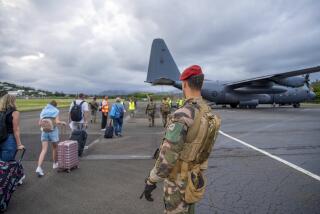France to Reinforce S. Pacific Base : Will Stress Presence in New Caledonia, Mitterrand Says
- Share via
PARIS — President Francois Mitterrand, relaxed and confident after his dramatic visit to New Caledonia, announced Sunday that France will reinforce its military base there to emphasize the French strategic presence in the South Pacific.
In a talk with journalists at the Elysee Palace after his televised announcement, Mitterrand insisted that the troops are not being sent to maintain internal order in the troubled French territory. Two months of violent confrontation between the native Melanesians and the white settlers on the islands have left at least 19 dead.
“It is being reinforced for external reasons,” he said. “We want to assert France’s strategic position in that part of the world.”
It was obvious, however, that reinforcement of the base, which now has 3,000 troops, would reassure whites that France really does intend to maintain a role in New Caledonia, even if the territory becomes independent.
France has offered the territory independence in 1986 with continued legal association with France. Many whites, who want New Caledonia to remain French, have been disdainful of the offer, fearing that it is an artful way of granting the territory complete independence. They might feel less suspicious if France demonstrated, by reinforcing the base, that it is serious about maintaining its strategic presence in the South Pacific and its political presence in New Caledonia.
Mitterrand made his announcement and spoke informally with journalists after spending almost 48 grueling hours aloft while flying to and from New Caledonia for a 12-hour visit Saturday.
Outburst of Violence Mitterrand, who returned to Paris on Sunday, made the trip after an outburst of violence last weekend seemed to have destroyed all hopes for acceptance of the French proposals.
“After the serious events of the last weeks,” Mitterrand said in his televised statement, “it was necessary first of all to prevent the dialogue from being broken off completely. I believe that objective has been attained.”
Although Mitterrand continued to endorse the government’s plan for a new status of independence-association for New Caledonia in 1986, he hinted that there might be some significant changes because of his 12 hours of talks in the territory. He said France’s special representative to the territory, Edgard Pisani, will “complete the proposals and make them precise,” giving guarantees to the various racial groups “that must learn to live together.”
The small population of New Caledonia is made up of a little more than 60,000 Melanesians, known as Kanaks, whose leaders are demanding total independence; a little more than 50,000 whites, whose leaders reject any kind of independence; and a little fewer than 30,000 Polynesians and Asians, whose views are believed to be close to those of the whites. A referendum on the French proposals is scheduled in July.
Reports Sunday from Noumea, capital of New Caledonia, indicated that many whites still display anger over Mitterrand’s visit there, denouncing it for giving them nothing. The reports came to Paris, however, before Mitterrand made his announcement about reinforc ing the base in Noumea.
In discussions with reporters, Elysee Palace spokesmen stressed the significance of the reinforcement of the military presence. An aide to Mitterrand noted that the South Pacific is strategically important to France because it conducts nuclear tests there and because, as a strong military power, it has strategic interests throughout the world. He also reminded the journalists that New Caledonia served the United States as a naval base during World War II.
Mitterrand did not give any details about how many will be added to the Noumea garrison. He said that announcement will come from Premier Laurent Fabius.
A week ago, Fabius declared a state of emergency in the territory and ordered 1,000 more police there, swelling the total of gendarmes and riot police on duty in the islands to 3,280.
Despite his show of confidence and his contention that his trip accomplished some significant results, Mitterrand did not try to minimize the seriousness of the threat of violence in New Caledonia. He announced that he is calling the French National Assembly into a special session this week to vote for a new state of emergency when the present one expires Thursday.
Mitterrand also announced that the territory’s nickel mine in Thio will be reopened shortly, as part of an attempt to return normal economic activity to the islands.
More to Read
Sign up for Essential California
The most important California stories and recommendations in your inbox every morning.
You may occasionally receive promotional content from the Los Angeles Times.













